If you’re a web designer or developer, you likely offer a variety of services. However, one area you may be overlooking is WordPress maintenance. Incorporating this option into your solutions can prove both rewarding and lucrative. However, you may want to reference up-to-date data before you get started.
That’s where our 2021 WordPress Maintenance Survey comes in. We polled a wide range of WordPress professionals who are currently offering maintenance services. These results can help you better understand the current landscape and guide you towards making the best decisions for your business.
In this post, we’ll go through seven key trends (in a few different categories) from our 2021 WordPress Maintenance Survey. We’ll analyze the data, and wrap up with some key takeaways. Let’s jump in!
Offering WordPress maintenance services
First up, we surveyed ManageWP users to learn more about the WordPress maintenance services they offer to their clients. Here are a fey key trends we found.
Trend 1: Most providers are web designers, developers, and professionals
The total number of respondents was 1,700. Of those participants, 1,419 (83.5 percent) were self-described web developers, designers, or other types of web professionals:
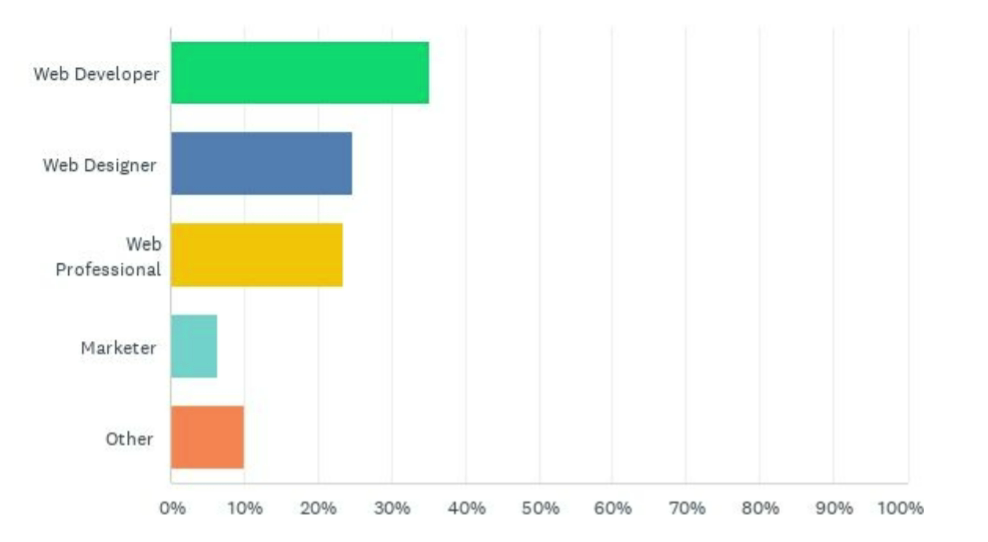
Half of the respondents (50 percent) categorized themselves as freelancers. About one-third (33.53 percent) were agency owners:
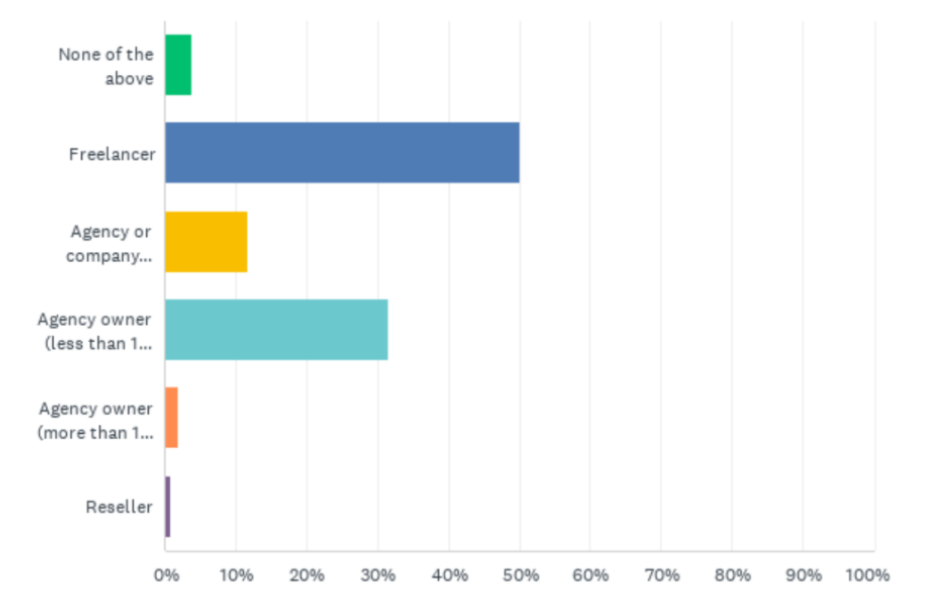 As with our 2020 WordPress Maintenance Survey, the majority of participants were located in Europe and the U.K. (42.35 percent). North America (39.18 percent) was close behind:
As with our 2020 WordPress Maintenance Survey, the majority of participants were located in Europe and the U.K. (42.35 percent). North America (39.18 percent) was close behind:
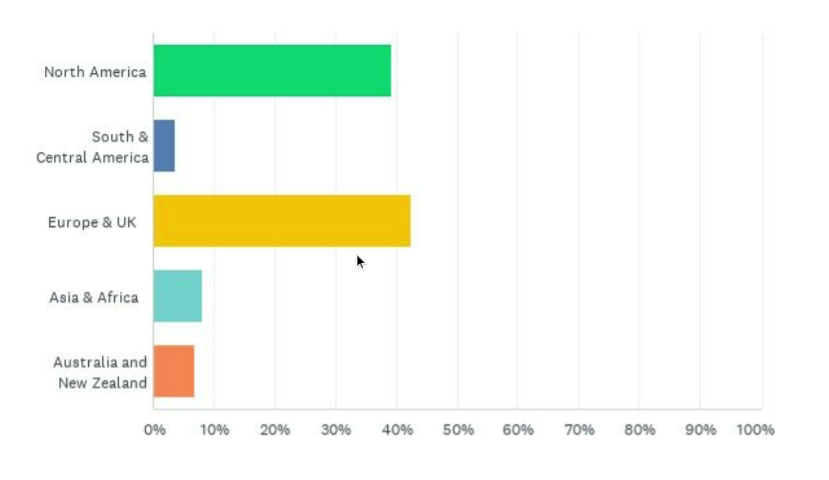
Of the respondents, an impressive 87.47 percent offer maintenance services. This is a key indicator for how popular these offerings have become.
Trend 2: The majority of providers focus on serving a small group of clients
We also asked our survey participants about their maintenance service clients. According to their responses, the majority (32.35 percent) serve 6–20 clients, followed by about a quarter (25.65 percent) serving just 1–5:
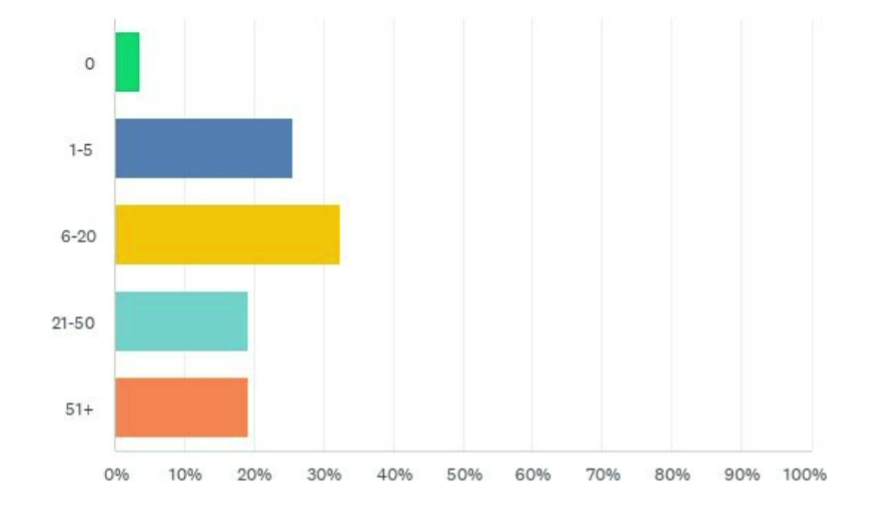
Only approximately 19 percent have 21 to 50 clients, and just as few serve more than 51 at a time. These findings show that most web professionals prefer focusing on a smaller group of clients. This could indicate prioritizing quality over quantity.
Unsurprisingly, the number of websites the maintenance providers handle is similar to their number of client contracts. The majority (32.98 percent) maintain between 6 to 20 sites, followed by 22.54 percent managing 21 to 50 sites:
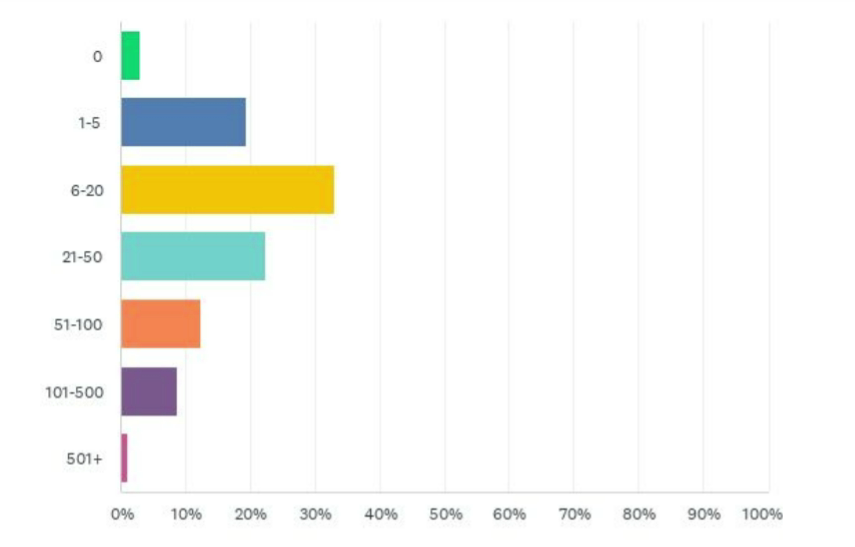
Only 19.37 percent serve 1 to 5 client sites. From this data, we can infer that most clients bring in more than one website.
Additionally, the clients’ geographic locations closely match those of the maintenance service providers. Most of the respondents’ clients are split between North America (41.53 percent) and Europe/U.K. (40.59 percent).
Trend 3: Providers tend to offer a three-tier package (or no package at all)
Most of our users offer maintenance services to their clients. However, the way they structure their pricing tiers varies. The majority of respondents (27.01 percent) don’t provide any tiered packages. Additionally, one and two-tier services have similar rates (13.68 percent and 18.56 percent respectively).
Having no tiers is about as common as having three, with 26.80 percent of respondents using a three-level system:
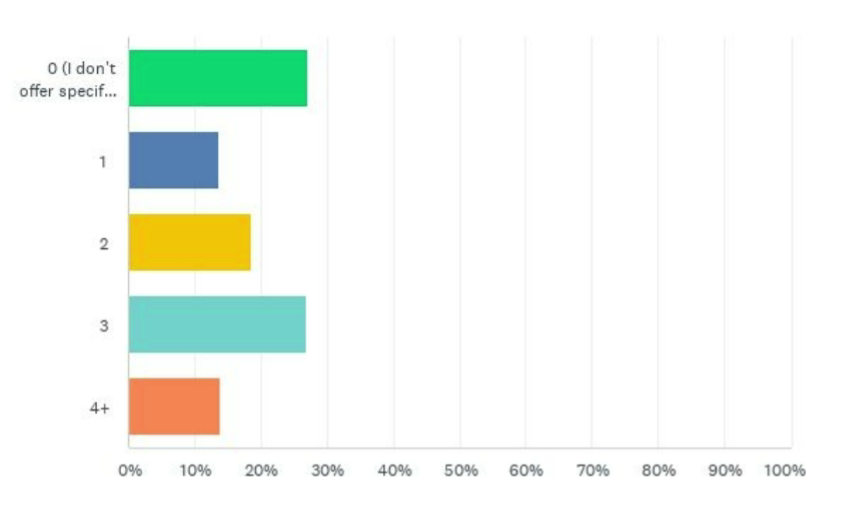
These findings are similar to what we discovered last year. The data demonstrates the increasing popularity of multi-tier maintenance service options.
Comparing single-tier vs. multi-tier packages
If we group together providers who don’t offer any packages with those who offer a single-tier, about 40 percent of respondents focus on providing a base level of maintenance services. Let’s take a closer look at what they had to say about the services their plans include and how they are priced.
Trend 4: Most single-tier packages include backups, updates, and security tasks
There are a wide range of maintenance tasks professionals can include in their services. This may consist of backups, WordPress updates, performance optimization, security, and more.
According to the survey, nearly all single-tier packages include plugin, theme, and core updates (96.76 percent). They also include backups (88.47 percent), security or malware cleanup (73.51 percent), and hosting (69.55 percent):
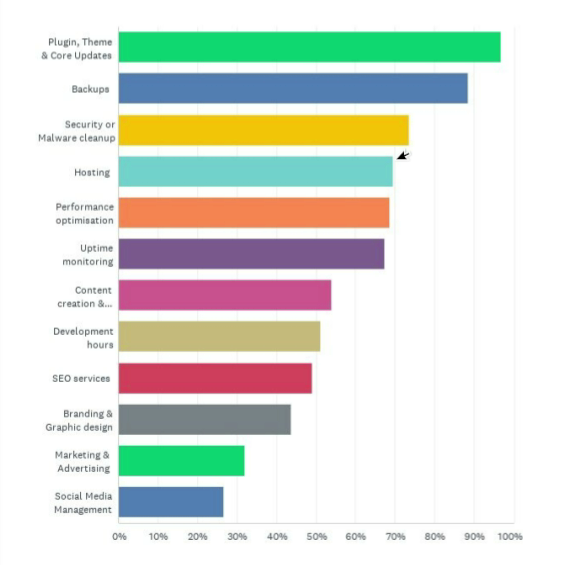
The rarest single-tier service was social media management (26.67 percent). Marketing and advertising (31.89 percent) was close behind. Therefore, if you’re a maintenance provider and you want to stand out from the competition, you might consider incorporating these solutions into your service.
When it comes to pricing, our findings show that single-tier providers charge about $153 per month per website for their services. This rate is an average of the expected cost for the plans of the 408 respondents who completed this survey section.
Trend 5: Multi-tier providers are more likely to offer security, optimization, and hosting services
Nearly 60 percent of maintenance service providers offer two or more tiers or packages. We asked these respondents what services they include in their highest and lowest plans, and what they charge clients monthly for each.
Of the multiple-tier maintenance offerings, the most popular services in the lowest tiers are similar to those provided for single-tier services:

The most common lowest tier services are plugin, theme, and WordPress core updates (90.79 percent), followed by backups (84.11 percent). As expected, the highest tiers also tend to include these essential services.
However, the higher tiers are more likely to include security and malware cleanup (75.99 percent), uptime monitoring (74 percent), performance optimization (68 percent), and hosting (58 percent).
Again, social media management, marketing and advertising, and branding and graphic design are rare among maintenance providers. For ambitious web professionals, this signals yet another opportunity to distinguish yourself from others in your field.
On average, service providers charge clients $455 per month for the highest tier. For the lowest tier, the average monthly rate is $93.
Hosting and page builders
As we’ve seen, some maintenance service providers offer hosting as well as design and development services. With that in mind, we were curious to learn more about our respondents’ preferences for handling hosting purchases. We also dug into what their favorite page builders were.
Trend 6: Most maintenance service providers either resell or directly purchase hosting for their clients
Over one-quarter (26.50 percent) of respondents recommend hosting products and providers to their clients. Typically, their customers then buy a plan directly from the host:
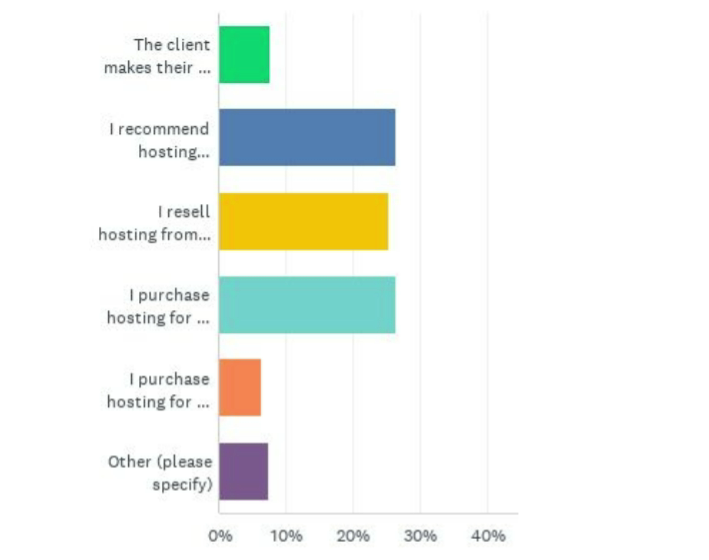
On the other hand, more than half (51.89 percent) of participants say they either resell hosting plans (25.46 percent) under their company’s white label or purchase hosting themselves (26.43 percent), later receiving payment from the client.
Trend 7: Most web professionals prefer page builders, such as Elementor, over Gutenberg
WordPress has been focusing in on the Gutenberg Editor for quite some time now. However, it’s not necessarily the preferred option for designers and developers. Our survey revealed that 71.13 percent of respondents don’t use Gutenberg:
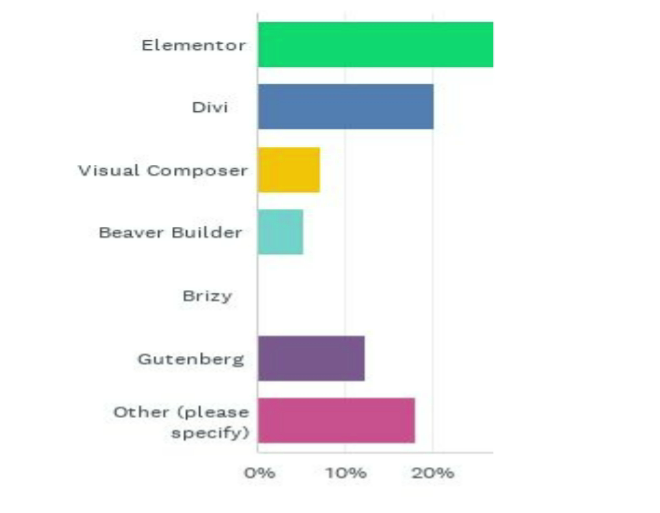
When asked about their ‘go-to’ page builder, the majority ranked Elementor (35.61 percent) and Divi (20.30 percent) as their top choices. Only about 12 percent chose Gutenberg.
3 Key Takeaways
Having current data to refer to can help guide your decision-making process. Our 2021 WordPress Maintenance Survey helped to highlight some important trends to be aware of. Now let’s take a look at some key takeaways from what we learned.
1. Offering maintenance services can help grow your business
With the majority of web designers, developers, and professionals providing maintenance to clients, it’s clear that these services can be a profitable way to scale your business. You also don’t need to put together an extensive operation. You can focus on anywhere from one to 20 clients to get started.
2. Your packages should cover backups, updates, and security tasks (at a minimum)
Whether you’re offering a single package, multiple-tier options, or custom solutions, including backups, updates, and security services is vital. However, if you want to set yourself apart from the competition, you might want to take it a step further. If that’s the case, consider adding the less common services to your list, such as social media and advertising.
3. Choose tools that help streamline and automate your tasks
Whether for handling hosting, designing pages, or managing uptime monitoring and security, the right tools can help streamline your maintenance services. For example, you might consider using a page builder such as Elementor to speed up your development and make ongoing maintenance simpler. Similarly, at ManageWP we offer many solutions for automating backups, updates, and other popular maintenance tasks.
Conclusion
Our 2021 WordPress Maintenance Survey results demonstrate the expansive market for maintenance services. Potential clients with a wide range of needs span the globe, so there are plenty of opportunities to grow your business.
As our results show, the ideal structure for maintenance packages is to offer multiple tiers for a modestly-sized client base. While backups, updates, and security tasks are staples, you can also gain a competitive advantage by including social media and marketing solutions. Plus, don’t forget that there are many aspects of providing website maintenance services that ManageWP can help automate.
Do you have any questions about offering WordPress maintenance services to your clients? Let us know in the comments section below!
Image credit: Unsplash.
「Uncategorized」カテゴリーの関連記事